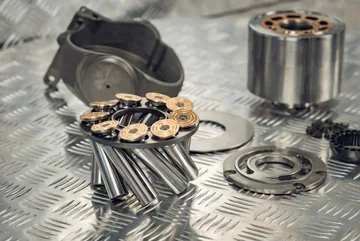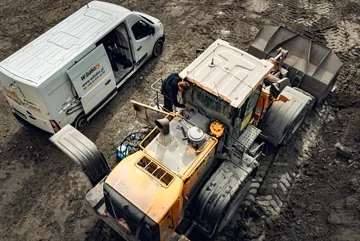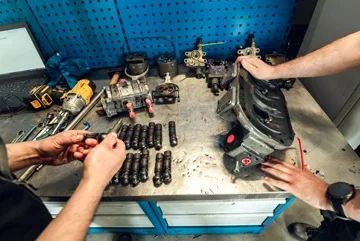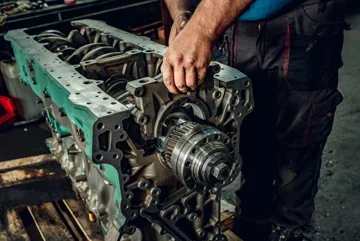Quick response to failures: why a reliable service is the key to success
Failures during the operation of a construction machine, especially in the event of hydraulic component failures - such as pumps and hydraulic motors - are a significant problem and a quick response to an unfortunate turn of events is crucial. In such a case, it seems necessary to repair the pump or hydraulic motor in a reliable service, which will be able to successfully carry out such an operation.

What does the repair of a pump or hydraulic motor involve?
The essence of repairing hydraulic components is regeneration, a process aimed at restoring working parameters that will be as close as possible to the initial factory values. Very often this is successful and the hydraulic pump can serve well in the machine for several more years.
Why is it worth regenerating a pump or hydraulic motor?
What speaks for the repair? First of all, the price, because the cost of regenerating a pump or hydraulic motor is definitely more friendly for our wallet than buying a new, original component from the machine manufacturer. Often such a new hydraulic pump costs tens of thousands of zlotys, and the prices of some even exceed 100,000 zlotys, while the cost of repair is usually a price range from 5 - 30 thousand zlotys.
Repairing a pump or hydraulic motor in a service specialized in this field is a guarantee of quality and cost optimization of the entire project. Only specialists in the field of power hydraulics, who have "cut their teeth" on carrying out complicated repairs of hydraulic pumps, can meet such requirements.

Stages of hydraulic pump repair
We can present the process itself based on a recently completed project in our workshop - the Kawasaki K3V63 hydraulic pump. At the very beginning, the pump underwent a thorough verification, without which there is no question of moving on to further stages and the success of the entire repair.
In this case, after disassembly, a detailed analysis of the component's condition showed that some basic elements need to be replaced - ball, separator, pistons, complete seals. At the next stage, the actual repair, all worn parts were replaced, and those that turned out to be in good condition were used to rebuild the pump, but first they were subjected to running-in and grinding to restore their optimal parameters and to fit the surfaces of the new cooperating elements. Specialized equipment and the experience of the serviceman greatly assist in the efficient conduct of the entire operation.

At this point, it is also worth paying attention to whether the service, which was commissioned to repair the hydraulic pump, has its own facilities, not only technical and staff, but also warehouse. The availability of spare parts "on hand" is a great advantage, because it happens that the waiting time for delivery from an external supplier is significantly extended, which in turn translates into the fact that the machine is still standing and not earning, generating additional costs.
Let's move on to the next stage, i.e. testing the hydraulic pump. A reputable service, after the repair is finished, subjects the results of its work to load and performance tests to confirm the effectiveness of the regeneration. In our service, all tests are carried out on a special diagnostic station, called a dynamometer. We conduct each test on site, and customers receive a chart with all the results in the form of a clear graph. The fact that each stage of the repair can be efficiently carried out in one location significantly speeds up the entire repair and reduces the cost of machine downtime, this is a factor worth paying attention to when choosing a service. After exhaustive tests and confirmation that the rebuild was successful, the hydraulic pump is still painted - in this state it is ready for further work in the machine.

Always repair?
There are situations in which the pump or hydraulic motor may already be so worn out that the decision to regenerate is not so obvious. The effectiveness of the repair is greatly influenced by the history of the hydraulic pump operation - how often regular services, replacement or filtration of hydraulic oil took place during it, whether cleanliness was taken care of and oil leaks in the entire hydraulic system were eliminated.
If during the disassembly and verification of the pump we notice symptoms indicating significant wear and tear and that the limit of cost-effectiveness of the repair is very narrow, we can always offer to buy a pump or motor from our warehouse. Such a solution shortens the implementation time to a minimum, i.e. the installation of a new pump in an excavator or another machine and is intended to be durable, i.e. the purchased component is to serve in the machine for many more years.
How to take care of pumps and hydraulic motors?
The previous part of the text signaled how important it is to treat your machine properly, especially the hydraulic system. It is worth developing good habits, such as checking for hydraulic oil leaks, or regular service - replacing hydraulic filters is a must. The quality of the hydraulic oil itself is also important, because contaminated and overworked oil significantly shortens the life of hydraulic components in construction machines. On our blog there is an article entirely devoted to the filtration of hydraulic oil, where the reader will learn everything necessary about this process and the benefits resulting from it. We encourage you to read.


















